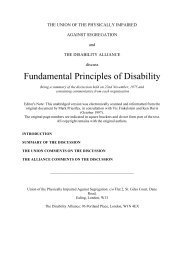Global-Report-Living-Colour-dr2-2
Global-Report-Living-Colour-dr2-2
Global-Report-Living-Colour-dr2-2
Create successful ePaper yourself
Turn your PDF publications into a flip-book with our unique Google optimized e-Paper software.
Inclusive Communities = Stronger Communities<br />
GLOBAL REPORT ON ARTICLE 19: THE RIGHT TO LIVE AND BE INCLUDED IN THE COMMUNITY<br />
73<br />
‰ Disability supports and services tied to housing<br />
When a person with an intellectual disabilities decides<br />
that he/she would like to move out of their family<br />
home or when their family is no longer there<br />
to care for them, the residential options<br />
available to them are significantly limited by<br />
the fact that the supports and services which<br />
they need are only available in certain settings<br />
such as care homes (group homes, seniors<br />
homes etc.). Having access to services and<br />
supports which could be used in the<br />
residential setting of their choice would<br />
significantly change the way in which people<br />
are included in the community.<br />
‰ Access to inclusive services<br />
Families reported that even when they have the<br />
finacial resources (personal or funded by<br />
government) to purchase services, the range of<br />
appropriate and reliable services available is<br />
extremely limited. From a public policy perspective<br />
this may be a result of the fact that government<br />
funding is heavily weighted towards the supply-side<br />
and the service agencies have not been forced to be<br />
accountable to what people with intellectual<br />
disabilities and their families are demanding. For<br />
example, government funding to sheltered<br />
workshops, group homes and day programmes<br />
means that people with intellectual disabilities who<br />
would chose to work in the open labour market or to<br />
live on their own or volunteer in the community often<br />
cannot access the supports they require to do so.<br />
We learned that in many cases the lack of access to<br />
inclusive services stems from a misunderstanding of<br />
what “community based” should mean. Governments<br />
and those who deliver services believe that the<br />
location of services in the community in itself means<br />
inclusive services as is the example from a provincial<br />
government in Canada;<br />
CANADA “Across the province of<br />
Ontario, there are 23,000 people with<br />
a developmental disability languishing<br />
on waitlists for services – 12,000 of<br />
those individuals are waiting for<br />
residential supports. 44-year-old<br />
Hamilton resident, Akhil Agarwal, is one<br />
of them. His 70-year-old father, Naresh<br />
Agarwal, is worried that families like<br />
theirs have to go into crisis to get the<br />
supports and services they need.” 4



